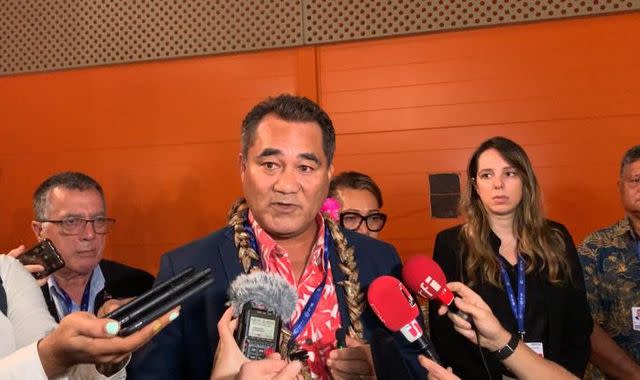COP28's draft plan will 'reduce' but not 'phase out' fossil fuels prompting uproar from island nations

The COP28 climate summit was thrown into uproar on Monday as a first draft of a climate pact suggested countries "reduce" fossil fuels - a watering down of a previous, stronger proposal to "phase out".
The draft agreement, also known as the "Global Stocktake", suggests a list of actions countries "could" take, including to "reduce both consumption and production of fossil fuels".
"We didn't come here for two weeks to negotiate about what countries 'could' do if they feel like it," one senior negotiator told Sky News.
Furious island nations suggested they would reject the deal after it had been watered down, and lost any deadlines - while rising sea levels driven by climate change nibble away at their shores.
"We will not go silently to our watery graves," said John Silk, minister for natural resources from the Marshall Islands and member of the AOSIS group of 39 nations.
The Pacific nation estimates it will cost $35bn (£29bn) just to salvage some of its islands.
Sky News understands the UK would also reject the deal as it stands, and the Least Developed Countries group of 46 countries also said it "cannot accept" the text.
A US state department official said the deal should be "strengthened", and German foreign minister Annalena Baerbock called it "far away from what the world needs".
Read more:
UN climate chief's emotional plea ahead of motion
Summit 'not focusing on the cause', say Pacific nations
Fossil fuel producers resisting the push to end fossil fuels - such as Saudi Arabia and Iraq - will be buoyed by the caveats and qualifiers in the text, including use of the word "could", rather than "must".
However, the countries in the OPEC group of oil exporters may still be spooked by a deal that demands both their production and demand from customers like China should fall. They are not keen on fossil fuels even being name checked.
Sky News approached Saudi Arabia's lead negotiator, Khalid Almehaid, with a request to comment, but he declined.
Some developing countries may also be relieved they don't have to phase out fossil fuels, as the financing support they need to do so has trickled rather than flowed.
COP28 president and senior Emirati Sultan Al Jaber accepted there was still "a lot to do" and countries "must still close many gaps".
He urged governments to "focus... on closing out the toughest issues that continue to remain" and "show even more flexibility to get us to the finish line".
Samoa's environment minister Cedric Schuster, speaking on behalf of the AOSIS group of small island states, claimed some countries had enjoyed "preferential treatment" - in an apparent jibe at members of OPEC, of which host nation UAE is also a member.
He said the "weak language" would "obliterate our chances" of limiting warming to 1.5C - a "red line" for island nations, which will lose even more land if global temperatures warm by more than 1.5C above pre-industrial levels.
"Any text that compromises 1.5 will be rejected," Mr Schuster warned.
Click to subscribe to ClimateCast with Tom Heap wherever you get your podcasts
Campaigners, overall critical of the draft, did welcome some other suggestions of action countries "could" take that were included in the draft - including a proposal to triple renewable power by 2030.
They were also cheered by the proposal to reduce fossil fuels in a "just, orderly and equitable manner", which allows developing and smaller economies to take more time than richer countries.
Earlier versions of the document were more of a shortlist of options, whereas today's version is regarded as a first draft of a final deal from COP28.

 Yahoo News
Yahoo News 
